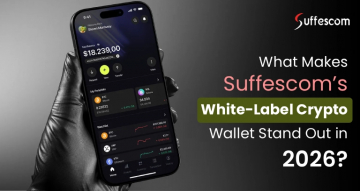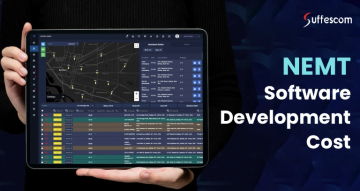Zero-Knowledge Proof in Blockchain: How It Works, Why It Matters, and Where to Start

Blockchains are a public network; anyone can monitor the transactions and identify who sent what amount to whom. In some cases, you may not want specific information to be made public, and that's when Zero-Knowledge Proofs or ZKPs come into the picture.
To prove something without revealing it.
As an integral component in enhancing the security of a blockchain transaction, a Zero-Knowledge Proof ensures that it remains private yet verifiable.
In this blog, we will explore everything about Zero-Knowledge Proofs in blockchain, including why they are essential, how they work, who needs them, what are the use cases for ZKPs, and how to build ZK proofs on blockchain.
Understanding Zero Knowledge Proof in Blockchain
As the term itself suggests, a ZKP verifies information by disclosing zero knowledge. For instance, person A wants to privately send $100 to B over Zcash (a cryptocurrency), and in this case, a ZKP would:
- Facilitate blockchain verification to ensure that A has a $100 balance and the transaction is entirely valid.
- Ensure that nobody can see A's or B's wallet balance, as well as the $100 amount.
- Building trust and ensuring the stakeholders that the transaction is trustworthy, as the ZKP proves it.
To put it in simpler terms, ZKPs are used to keep things private while still proving that the information is true. It is like stating that you or the information is trustworthy without disclosing the secrets.
Now, if you wanted to explain the same concept to your team, how would you do it? Let's understand with an example!
Imagine two teams in a company want to check if they're paying the same price to a vendor, but due to confidentiality, they can't share the exact figures.
Instead, they use a secure method: they each interact with a set of locked boxes labeled with possible prices. One team secretly selects the box for their price and keeps its key. The other drops a note into their price box.
When the first team unlocks their box and finds the note, they can confirm whether the prices match, without ever knowing the other's actual amount. That's how zero-knowledge proofs work.
The following are the key points to note;
1. Zero Knowledge: You don’t reveal the information
2. Proof: You prove that the information is valid and true
3. Blockchain Use: ZKPs make transactions private but verifiable, making them ideal for cryptocurrencies or private smart contracts.
Ready to Build Something Private?
Whether you're curious or committed, we’ll help you build something meaningful with Zero-Knowledge Proofs without the guesswork.
Various Types of Zero Knowledge Proofs in Crypto
Let’s zero in to understand the various types of Zero-Knowledge Proofs, starting with;

1. Interactive ZKPs
Interactive ZKPs work like a magician’s trick. How the magician (the prover) interacts with their audience (the verifier), convincing them that the trick is real, while not disclosing the trick behind it. Verifier asks random questions; prover answers them correctly to demonstrate knowledge without revealing it.
An Interactive ZKP is straightforward and easy to understand. Its limitation is that it requires both sides to be online and available for the entire exchange, so it doesn't scale well. Essentially applicable for academic/crypto experiments, these ZKPs are not practical for blockchains.
2.Non-Interactive ZKPs (NIZKs)
Imagine a magician performing a trick, sealing it in a box, and handing it over. Anyone who later opens this box and sees the proof and identifies that the trick is real. In contrast to Interactive ZKPs, with Non-Interactive ZKPs, the interaction takes place only once.
NIZKs enable provers to generate a standalone proof that anyone can verify.
Non-interactive ZKPs are highly scalable and efficient, making them suitable for decentralized systems. But it requires a secure setup and is heavier on computation. NIZKs set a foundation for other ZKP types, including SNARKs, STARKs, and Bulletproofs.
3. zk‑SNARKs
zk‑SNARKs or Succinct Non‑Interactive Arguments of Knowledge are small, fast, and non-interactive. These features make them ideal for business-grade blockchain use. Think of it as a powerful proof, like a sealed envelope with a stamp of authenticity.
You can quickly verify it’s legit, without opening it.
To trust information without interaction, a “trusted setup” is required, which is a one-time process for creating special keys.
zk‑SNARKs ensure lightning-fast verification with supporting tools. The biggest limitation is that it needs a trusted setup and is not fully resistant to quantum attacks.
4. zk‑STARKs
zk‑STARKs or Scalable Transparent Arguments of Knowledge are similar to the SNARKs, but it doesn’t need a trusted setup. It works on hash functions instead of harder-to-trust computations. Imagine it as a public vault that constructs proofs openly without any hidden setup.
The provision of a no-trust setup makes it ideal for large-scale verifications.
With the assurance of robust security, it protects the systems from quantum attacks. On the other hand, its larger proof sizes make it slow for verification. Since it is a new ecosystem, it is still not widely used.
5. Bulletproofs
Think about a case wherein you want to disclose a range, for instance, your wallet balance is between $100 and $500, but don't want to disclose the exact amount. That's where Bulletproofs come in. They create small proofs (around 1 KB) without any trusted setup.
Its simplicity makes it ideal for secure financial checks. Bulletproofs are widely used in private blockchains such as Monero. Regarding its limitations, the proof size and verification time increase with complexity, and it is not resistant to quantum attacks.
Why are Zero-Knowledge Proofs in Blockchain Becoming Popular?
Several factors support the popularity of Zero-Knowledge Proofs in blockchain. Let's explore!
1. Higher Security and Privacy
As ZKPs enable the users to prove something is true without disclosing the information. This provision helps protect sensitive data and build trust. Since the information is hidden, it reduces the risk of data leaks and fraud.
2. Scalability Solutions in Blockchain
ZK rollup, a layer-2 scaling solution, combines multiple transactions into one proof, significantly reducing on-chain work. It speeds up processing time and cuts costs. It makes blockchains much more practical for high-volume, real-world business use.
3. Building Trust
A disguised lack of trust is present in the decentralized solutions; since users do not know each other, they often lack mutual trust. ZKPs help reduce this trust gap by verifying claims such as adequate balance.
A ZKP does not share private data to establish the truth of the information. The Zero-Knowledge cryptography technique ensures verifiable privacy and builds confidence without a central authority.
4. Addressing Regulatory and Compliance Needs
Companies can prove compliance like KYC/AML without disclosing personal information, a major regulatory advantage. It makes it easier to work in regulated industries, such as finance, healthcare, or elections, while still protecting user privacy.
5. Growing Demand for Privacy in the Digital Age
Amidst rising data breaches and consumer concerns, people increasingly expect to keep their information private, yet still use digital services. ZKPs let businesses meet this demand by giving users control over their data, without compromising functionality.
Getting Started with Zero-Knowledge Proofs in Crypto
ZKPs are no longer a cryptographic experiment; they are becoming a standard component, providing a competitive advantage for businesses that prioritize privacy, trust, and security. Let's explore how you can build ZK proofs on blockchain.
Hire or Partner with ZK-Savvy Blockchain Teams
You don't need to be a ZKP expert, but it is essential to understand how this concept works, how it benefits your business, and who provides the best services. There are two alternatives:
- Hiring blockchain developers with experience in zk-SNARKs, zk-STARKs, or Bulletproofs, or
- Partnering with a blockchain development company that specializes in Zero-Knowledge protocol development solutions.
The latter alternative would bring greater benefits: it helps transform your business goals, like customer data privacy or transaction verification, into real and working prototypes. Other than this, you get:
- Access to specialized expertise
- Faster time-to-market
- Cost-efficiency
- Custom use-case
- Regulatory compliance
- Long-term strategic support
- Access to the ZKP ecosystem
The primary focus should be on selecting the development services or company. Certain factors, as outlined below, can aid in this decision.
1. Firstly, examine the experience with ZK Proofs; check if they have built actual projects using zk-SNARKs, zk-STARKs, or Bulletproofs. Identify if they understand both privacy and scalability use cases.
2. Check the portfolio or case studies of the potential companies. Do they have real examples of ZK-based applications? It would be great if they worked in industries similar to yours (finance, identity, supply chain, etc.).
3. Check for their proficiency with ZK-friendly platforms.
4. Focus on the team composition; they must have in-house ZK cryptographers, smart contract developers, and frontend engineers. Are there professionals available for full-time or freelance work?
5. Get details about their development process; do they follow a project plan with an agile development approach?
6. Ask for a pilot or proof-of-concept to identify if they can build a prototype before committing to full-scale development.
7. Check client reviews and reputation. The company must have positive testimonials, LinkedIn feedback, or Clutch reviews.
8. Check for post-launch support. Do they offer maintenance and updates after the project goes live?
9. Finally, discuss the budget and flexibility. Are they transparent about pricing and timeline? Do they offer flexible models, such as fixed-price, hourly, or dedicated team?
Choose the ZK-Supporting Blockchain
Several blockchains support Zero-Knowledge Proofs by default. ZK blockchain prevents you from needing to build the Zero-Knowledge Proofs from scratch.
- zkSync and StarkNet are explicitly built for ZK scalability and privacy.
- Polygon zkEVM, Mina, and Aztec also offer ZK environments.
Instead of building the entire system from scratch (which is complex, time and cost-intensive), you can simply build on top of a platform that already handles the complex parts for you. That's what platforms like zkSync, StarkNet, or Polygon zkEVM do: they give you a ready-to-use foundation that:
- Supports ZK proofs
- Keeps things fast and private
- Handles the technical complexity in the background
Start with a Small Project
If you are curious about using ZKPs, don't try to build an entire product around it on day one. Instead, start small, test how it works for your needs, and learn as you go. Why does it make sense to start small?
- ZK tech is new and complex. You want to ensure it solves a real problem before investing too much time or money.
- It’s safer. If something doesn't work, you can fix it without affecting the rest of your system.
- The business adapts faster. You'll quickly discover what your team and users need, from technology to training to UI.
Here's how you can put the pilot project to use:
1. Execute private voting for internal decisions. Allow employees or customers to vote anonymously, without revealing their choices. Develop a ZK-based voting system for a single survey or decision.
2. Verify payments without sharing accounts. Create a feature that proves a transaction occurred or a payment was made, without displaying the amount paid.
Once the pilot works well and presents desired results, you can improve it, add more features, or scale it to accommodate more users. The output acts as proof that ZKPs are a worthwhile investment. Additionally, you'll gain real-world experience, which helps you avoid mistakes during the full rollout.
Wrapping Up!
Zero-Knowledge Proofs are no longer just a futuristic idea; they're a practical, proven solution for businesses that value privacy, trust, and data security. As industries move toward more secure and transparent systems, ZKPs are paving the way for a more reliable digital future.
From private transactions to regulatory compliance, their applications are extensive and continue to grow. It's clear: Zero-Knowledge-based solutions are here to stay. For businesses looking to explore this powerful technology, partnering with experienced leaders is key.
Suffescom Solutions brings deep blockchain expertise and a strong commitment to delivering customized, scalable Zero-Knowledge solutions that meet real-world business needs.
FAQs
1. What is a zk blockchain?
A zk blockchain uses zero-knowledge proofs to keep transaction data hidden while still proving it's correct, making it both private and trustworthy.
2. What are Zero-Knowledge Proofs in blockchain?
Zero-Knowledge Proofs enable users to prove something is true, such as a valid payment, without revealing the actual data behind it.
3. What is an example of a zero-knowledge protocol?
Zcash is a good example. It lets people send private cryptocurrency transactions using zero-knowledge proofs to keep details secret.
4. What is the purpose of Zero-Knowledge Proof in blockchain?
The primary purpose of Zero-Knowledge Proof in blockchain is to improve transactional security and increase user trust in the blockchain network.
5. What are the Zero-Knowledge Proof's applications?
Zero-Knowledge Proofs are used in private payments, identity checks, secure voting, and proving compliance without exposing personal or sensitive data.
6. How does Zero-Knowledge Proof work?
A ZKP or Zero-Knowledge Proof is a cryptographic tool that uses special computation to show that someone knows or owns something without revealing what that something is.
7. How is the Zero-knowledge proof implementation done?
Developers use tools and platforms like zkSync or StarkNet to add ZK features to apps, keeping data private and secure.
8. What’s the difference between SNARKs and STARKs?
SNARKs are fast but need a trusted setup. STARKs are slower but more secure and transparent.







